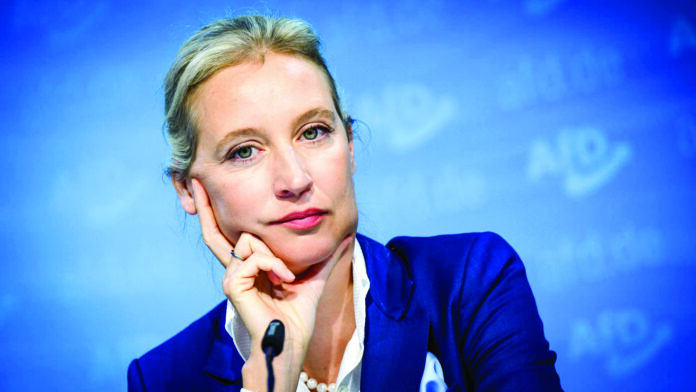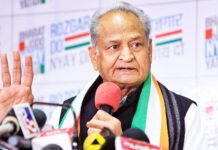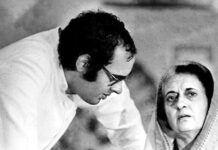All eyes will be on the support given to the far right party, Alternative fur Deutschland (AfD), which has consistently been polling second in Germany for more than a year and a half.
London: With Europe still recovering from the excoriating speech by US Vice President Vance in Munich last week, the European Union’s most populous and important country, Germany, goes to the polls today to elect a new parliament. The stage is now set for a contest between established parties and a surge of smaller contenders. Critically, the election comes at a time of heightened political uncertainty, with deep divisions over the country’s economic future, immigration policies and its role on the global stage. The future of the European Union might even be at stake.
Originally scheduled for September, today’s snap election is the result of the collapse of the governing coalition during last November’s political crisis. Olaf Scholtz, the incumbent chancellor of Germany, sacked his finance minister, Christian Lindler, over disagreements on how to revive Germany’s shrinking economy. Scholtz then lost a confidence vote in parliament by a large margin. Lindler is the leader of the Free Democratic Party (FDP), one of the three parties of the governing “traffic light” coalition, named after their traditional colours, respectively red, yellow and green. It’s very unlikely that any of the seven parties running in the election will have a majority in the Bundestag, the German parliament, so another coalition is expected. The big question is which of the parties will make up a government to lead Germany at a critical moment in its post-war history.
All eyes will be on the support given to the far right party, Alternative fur Deutschland (AfD), which has consistently been polling second in Germany for more than a year and a half. Founded in 2013, the AfD quickly embraced far-right policies, with many of its leaders espousing far-right rhetoric. The party’s leader in the eastern German state of Thuringia, for example, Bjorn Hocke, once described Berlin’s Holocaust memorial as a “monument of shame” and called for a “180-degree turnaround” in Germany’s handling of its Nazi past. Picking up the same theme, Alexander Gauland, the party’s co-founder, trivialised the Nazi era as “just a speck of bird’s muck in more than 1,000 years of successful German history. It’s no wonder that the AfD is sometimes described as a neo-Nazi party.
Mainstream German parties have pledged not to work with or form a government with the AfD because of its extreme views. The AfD was even excluded from attending last week’s Munich Security Conference, a move criticised by Vance. Having snubbed the opportunity to meet Chancellor Schultz, Vance met the AfD co-leader, Alice Weidel, outside the conference hall. In a landmark address he then denounced the pariah status placed on the AfD saying “Democracy rests on the sacred principle that the voice of the people matters. There’s no room for firewalls”, he said, referring to the pledge of the mainstream parties not to work with the AfD.
Vance is not alone in supporting the AfD. In January, Elon Musk made a virtual appearance at an AfD rally reiterating his support for the party, telling the crowd that it’s time to “move on” from “past guilt”. “Children should not be guilty of the sins of their parents, let alone their grandparents”, said Musk in a reference to the country’s history with the Nazi party. Musk made waves last month during Donald Trump’s inauguration celebrations after making a ‘stiff-armed’ salute, which critics were quick to liken to Nazi ‘Sieg Heil’. Musk denied his action and quickly brushed off the comparison, proceeding to post a series of Nazi-themed puns.
The AfD’s major appeal to voters is its policy on immigration. Quite simply, its members say enough is enough – or even too much. They assert that many of Germany’s problems started when former Chancellor Angela Merkel decided in 2015 to open Germany’s borders to anyone who claimed to be a refugee. Millions entered the country and a compliant German media argued that these would be the doctors and engineers of the future who would pay for everyone’s pensions. Nearly a decade on, the AfD claims that many of the arrivals still have no jobs, can’t speak German and rely on benefits. What’s more, they are blamed for a significant rise in terror attacks and an increase in violent crimes linked directly to some of these immigrants. AfD advertising plays on the feeling in the country that Germany is no longer the safe, prosperous country that the native populations remembers from their childhoods. AfD also points to their belief that half of all welfare recipients are foreigners, with more than 152 billion euros paid out to them since 2015.
Even with polling at about 21 percent, the AfD is unlikely to be part of Germany’s next government because of their pariah status. With no party set to win an outright majority, coalition negotiations will be key in shaping Germany’s future. The conservative Christian Democratic Union (CDU) and its sister party, the Christian Social Union (CSU), currently lead the polls at around 30 percent, making the CDU leader, Friedrich Merz, the frontrunner to replace Chancellor Scholz of the centre left Social Democratic Party (SPD). The big question is who Mertz might select as a coalition partner. In a recent TV debate, Mertz said that he was open to coalition talks with the SPDs and Greens, while yet again dismissing the AfD as unviable partners.
Along with immigration, Germany’s economy will play a central role in the voters’ minds today. Formerly Europe’s economic powerhouse, some international experts are now calling Germany the ‘sick man of Europe’ as they watch the country’s industrial sector sputtering. Germany’s industry was dealt a blow from China’s post-COVID growth slowdown reducing demand from Germany as a key export partner, but there is little doubt that Vladimir Putin’s full-scale invasion of Ukraine hit Germany’s economy exceptionally hard, mainly because its energy-intensive industries were heavily dependent on cheap Russian gas piped directly to the country via the Nord Stream pipeline. In December 2021, before the invasion, Germany imported 5.2 billion cubic metres of natural gas from Russia. Since September 2022, Germany has imported none, instead shelling out billions of euros to set up floating terminals to import liquefied natural gas that comes by ship, not by pipeline.
Another major issue facing the new government is what to do about Germany’s contentious ‘debt brake’. Enshrined in the constitution after the 2008 financial crisis, the brake limits the central government’s budget deficit to just 0.35 percent of GDP. That’s considerably more limiting than the broader EU rule of 3 percent of GDP, and a far cry from the 6-7 percent deficit that Washington has been running. Critics argue that this heavily restricts borrowing capacity, despite Germany’s ‘room’ to spend more, given its relatively low debt-to-GDP ratio of 60 percent. The debt brake is especially challenging in view of rising healthcare and pension costs over the next legislature period, along with the widespread calls for defence spending, brought about by the Trump administration.
The energy crisis amid the war in Ukraine has made it even harder for Germany to embark on transitioning its cornerstone automobile industry from internal combustion engine vehicles to electric vehicles. Currently, Germany is fast losing ground to US and Chinese vehicles as a result of its sluggishness in embracing electric cars. Its iconic automobile manufacturer, Volkswagen, has already announced plans to close two factories this year, the first time in its long history. The company’s Chief Executive, Oliver Bloom, told workers last September that Volkswagen had “a year, maybe two” to adapt to a slump in European car sales.
Regardless of who gets elected today, Germany is set to face a tough 2025, with stagnating growth, fiscal uncertainty, high energy costs and the growing geopolitical risks resulting from the US pivoting away from Europe. As they cast their votes, many citizens will be mindful of the fact that their country was the only G7 economy to shrink last year and is set to be the group’s slowest growing economy again this year. Some pundits say Germany’s economic model is irreparably broken, having relied so heavily on cheap Russian energy. But others are more optimistic, arguing that lower energy costs which could follow a Ukraine-Russian ceasefire arrangement, together with a looser fiscal policy which includes addressing the debt brake, will pull Germany through its current problems. This is important for everybody, as what happens in Germany doesn’t stay in Germany. It tends to ripple around the world.
* John Dobson is a former British diplomat, who also worked in UK Prime Minister John Major’s office between 1995 and 1998. He is currently a visiting fellow at the University of Plymouth.








